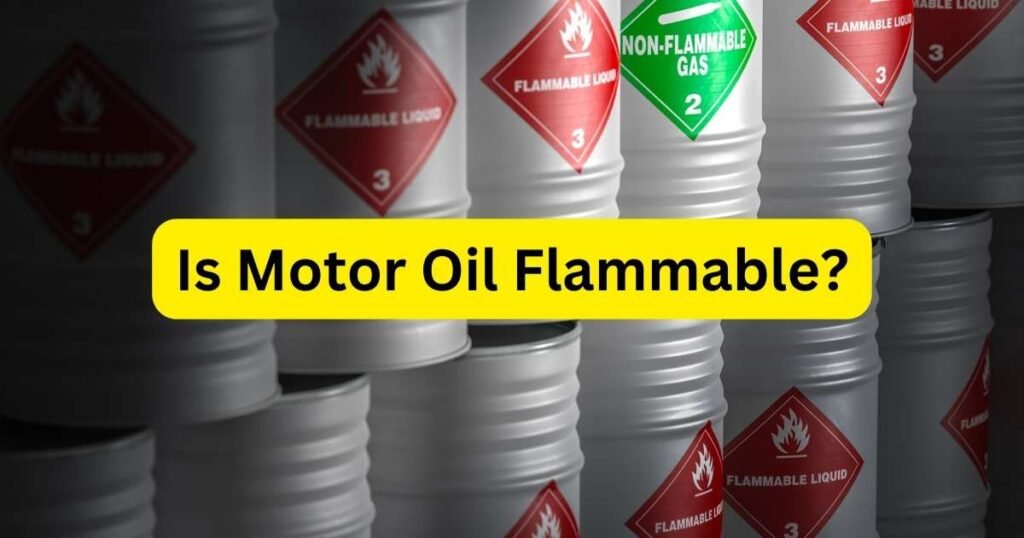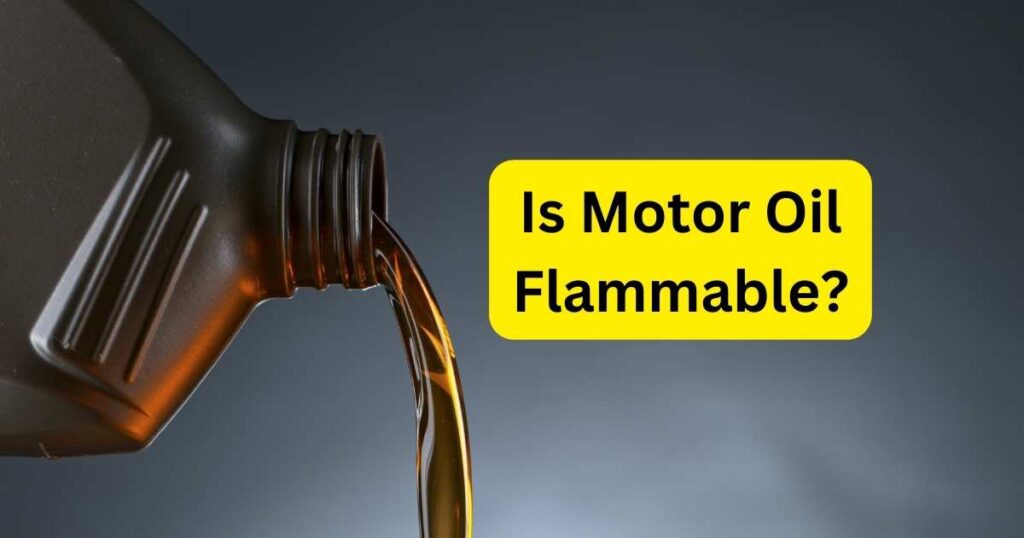Motor oil is really important for cars and other vehicles. It helps everything inside the engine move smoothly. Did you know it can catch fire if it gets too hot? That’s why it’s super important to handle it carefully.
I’ve worked with engines for a long time, and I’ve learned a lot about motor oil. Even though it’s great at keeping engines running well, we have to remember it can be dangerous. Always making sure it doesn’t get too hot is key to staying safe.
Now, let’s talk about why motor oil can catch fire. When oil heats up too much, it can start a fire. This is something we need to watch out for when we’re working with engines. By knowing this, we can keep ourselves and our cars safe.
Table of Contents
Is motor oil flammable?
Motor oil isn’t something you’d think of as easily catching fire. According to the Occupational Safety and Health Administration (OSHA), flammable liquids ignite at temperatures between 149- and 200 degrees Fahrenheit (65 to 93 degrees Celsius). However, motor oil needs much higher temperatures, around 300 to 400 degrees Fahrenheit (149 to 204 degrees Celsius), to burn.
This high ignition temperature means that a small spark won’t set motor oil on fire. If your engine gets really hot, for example, because it’s low on oil, then you could have a problem. The high heat might make the oil catch fire. Keeping your engine well-oiled isn’t just good for your car; it also helps prevent fires.
When you compare this to other fuels, like gasoline or diesel, you can see some differences. Gasoline can ignite at a much colder temperature, around -40°F, and catches fire by itself at about 536°F. Diesel has a flash point of about 140°F and ignites on its own at around 482°F. This shows that motor oil isn’t as flammable as gasoline but can be more so than diesel under certain conditions.
What is Combustible vs. Flammable: Key Differences for Engine Oil
Motor oil isn’t as quick to catch fire as gasoline, but it’s still important to know how it can be dangerous. Motor oil is considered combustible, not flammable. This means it needs higher temperatures to burn. Its flashpoint, the temperature where it can start to burn, is above 200°F.
If motor oil leaks, it could be a fire hazard. When it drips onto hot parts of the engine like the exhaust manifold, the heat can be enough to ignite the oil. This happens because those parts often get hotter than the oil’s flashpoint.
Also, if oil leaks aren’t fixed, oil can build up on the engine. Over time, this oil can catch fire if it gets hot enough. It’s crucial to keep an eye on any signs of oil leaks to prevent fire risks in your car.
What is Motor Oil Classification? Flash Point and Combustible Liquids
The NFPA sorts flammable and combustible liquids into three classes based on the temperature at which they can ignite. Class I includes flammable liquids with a flashpoint under 100°F. Class II and Class III are for combustible liquids, which have flashpoints higher than 100°F.
Each safety cabinet can hold up to 60 gallons of any class of flammable liquids, according to OSHA regulations. No more than three safety cabinets are allowed in one facility. Motor oil, for instance, is a Class IIIB combustible liquid with a flashpoint between 250-450°F. For accurate flashpoint details, always check the Safety Data Sheets of the oil you are using.
Motor oil usually has a flash point over 150°C (302°F). This makes it a combustible liquid, not a flammable one. Combustible liquids need more heat to catch fire compared to flammable liquids.
Flammable liquids have a flash point below 60°C (140°F). They can ignite easily at room temperature or with just a small spark, like gasoline. Combustible liquids, on the other hand, need a higher temperature to start burning. Examples include diesel fuel and motor oil.

Why Engine Oil is Less Volatile Than Flammable Liquids?
Flammable liquids burn because of the vapors they release, not the liquid itself. The smaller the molecules in the liquid, the easier it is for them to turn into vapor. This means they can catch fire with less heat.
Engine oil is different because it has bigger molecules, from 18 to 34 carbon atoms each. These strong bonds make it harder for the oil to vaporize and burn. That’s why engine oil is less volatile and considered combustible, not flammable.
What are the Risks of Motor Oil Flammability?
Motor oil fires are dangerous. They can start in different ways like when oil spills or leaks in a garage or engine. Sometimes, they happen because the oil was stored or thrown away the wrong way. They can also start from vehicle accidents or even on purpose by someone.
The results of these fires are really serious. People can get hurt or even die. They can also destroy property and harm the environment by polluting it. These fires show why it’s important to be careful with motor oil to prevent accidents and keep everyone safe.
How to Minimize Fire Risks Associated with Engine Oil Leaks?
The risk of a fire from a motor oil leak is quite low. Still, it’s important to fix any leaks right away to avoid problems. To keep your car safe, you should check under the hood regularly. Look for any new oil stains or drips that suggest a leak.
If you find an oil leak, don’t wait to get it fixed. Make an appointment with a good mechanic who can find out what’s wrong and repair it quickly. It’s also vital to keep the oil in your engine at the right level. This helps stop leaks and keeps your engine running smoothly. Always use the type and amount of oil your car’s manual recommends.
How to Handle Motor Oil Safely?
Motor oil can catch fire if not handled carefully. It’s important to keep it in a cool, dry place where there is no heat or anything that can start a fire.
When you’re done with motor oil, make sure to recycle it or take it to a place that collects it safely. This helps prevent fires and protects the environment.
Always wear protective clothes and safety glasses when you work with motor oil. This keeps you safe from splashes that can irritate your skin or eyes.
Using the right tools and equipment is also important when handling motor oil. This makes sure you do the job safely and correctly.
Follow the correct steps when you change the oil or do maintenance. This helps avoid spills and other dangers that could start a fire.
What are the Regulations and Standards for Motor Oil?
The automotive industry follows strict rules for motor oil to keep cars running safely and smoothly. These include the API or American Petroleum Institute certification. This makes sure the oil meets certain standards for quality.
Another important guideline is the SAE viscosity classification by the Society of Automotive Engineers. This tells us how thick the oil is and how well it flows at different temperatures.
There are also laws set by government agencies like OSHA and the EPA. OSHA makes sure the oil is safe to use at work while the EPA checks that using the oil does not harm the environment. These guidelines help everyone use motor oil safely and responsibly.
How to Extinguish a Motor Oil Fire?
If a motor oil fire starts, you need to act fast and safely. First, if you can, turn off anything that’s making sparks or heat. This could be the car’s engine or any machine nearby.
Then, grab a fire extinguisher that is made for Class B fires. These are fires that involve flammable liquids like motor oil. If you don’t have a fire extinguisher, you can use sand or a fire blanket to cover the fire and cut off the oxygen that feeds it.
Make sure to leave the area right after you’ve done what you can to stop the fire. Then, call the fire department or emergency services to handle it. They know how to deal with fires safely and can make sure the fire is completely out.
What Should I Do in Case of Emergency?
If a motor oil fire erupts, here’s how I handle it. I evacuate the area right away. It’s not safe to try to put out the fire unless I have a fire extinguisher and know how to use it.
Next, I call 911. It’s important to let emergency services know about the fire as soon as possible.
If it’s safe, I use a dry chemical fire extinguisher to smother the flames. It’s very important not to use water because it can make the fire worse by spreading the burning oil.
Safety is always my top priority. If the fire seems too big to handle, I don’t hesitate to seek professional help.
Final Words
Motor oil has a high ignition temperature, so it usually won’t catch fire under normal car operating conditions. It’s still very important to change your oil regularly. This helps prevent leaks and overheating, which could lead to a fire hazard. Regular maintenance keeps your car running safely and smoothly.
FAQs
Can engine oil spontaneously combust?
No, motor oil can’t catch fire on its own. This usually happens with materials that can oxidize quickly, like oily rags.
Is synthetic motor oil more flammable than conventional oil?
Actually, synthetic motor oil is slightly less flammable than conventional oil because it has a higher flashpoint.
Should I dispose of used motor oil at home?
Definitely not. Used motor oil is dangerous and should not be thrown out with your regular trash or poured down drains. You should take it to local mechanic shops or recycling centers that know how to properly dispose of it.


